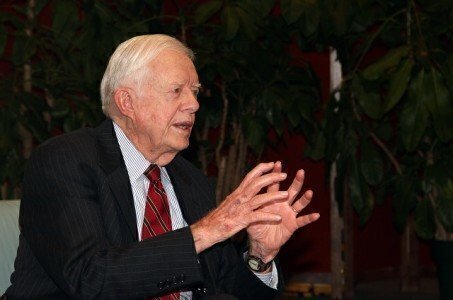Today we remember former President Jimmy Carter. The Georgia native was certainly unique in comparison with other Presidents.
 Carter, the only United States Naval Academy graduate to be elected to the White House, endured a roller-coaster four years in office. But much of his public career began after leaving Washington, D.C. in 1981.
Carter, the only United States Naval Academy graduate to be elected to the White House, endured a roller-coaster four years in office. But much of his public career began after leaving Washington, D.C. in 1981.
Here’s a quick look at some fascinating facts about the 39th President:
1. Born on October 1, 1924, in Plains, Georgia, young James Earl Carter Jr. was the first person on his father’s side of his family to graduate from high school. He passed away on Dec. 29, 2024 at the age of 100.
2. Carter entered Annapolis during World War II. The future President graduated in the top 10 percent of his class in 1946, and he and his new wife, Rosalynn, moved frequently as his Navy assignments changed.
3. Carter gave up his military career to save the family peanut farm. And as a parent, Carter became involved in local politics when he served on an education board.
4. He supported civil rights, which hurt his early political career in Georgia. After a poor showing the 1966 governor’s race, Carter adopted a more centrist image, and he won the election in 1970. He became known as a budget cutter while in office.
5. Carter was a “dark horse” presidential candidate in 1976. The future President was tied for 12th in early polling, well behind former Alabama Governor George Wallace and former nominee Hubert Humphrey. He used his image as a Washington outsider to defeat Gerald Ford in the general election.
6. The Carter presidency was a study in contradictions. President Carter played a key role in the Camp David peace accords, but he also struggled with Congress and the media. The Iranian Hostage crisis proved to be a significant factor in his 1980 loss to Ronald Reagan.
7. Carter’s legacy grew after the 1980 loss. F. Scott Fitzgerald wrote there are no second acts in American lives, but Carter’s public career after the White House is an exception.
8. In 1982, he founded the Carter Center, which has played an active role in human rights and disease prevention issues globally. The Carters helped publicize Habitat for Humanity, also.
9. Carter received his Nobel Prize in 2002. He received the award "for his decades of untiring effort to find peaceful solutions to international conflicts, to advance democracy and human rights, and to promote economic and social development."
10. Harry Truman was Carter’s favorite President. Carter told The Guardian in 2011 that he admired Truman for not trying to profit off his presidency.







